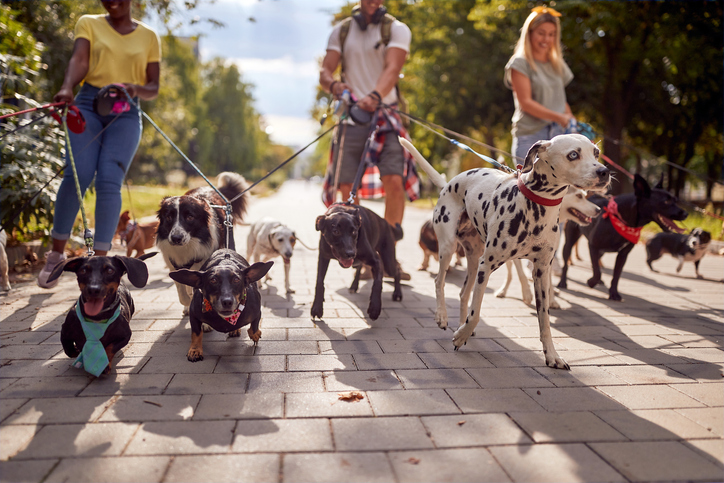Like any other business, dog walkers need insurance – even if it’s a side hustle.
This article will take you through the insurance essentials that come with being a dog walker. Alternatively, you can jump straight through to the section you’re more interested in.
- Do you need insurance to be a dog walker?
- Public liability insurance for dog walkers
- Other insurance for self-employed dog walkers
- Car insurance for dog walkers
- What does dog walker insurance cover?
- How much is insurance for dog walkers?
- Can I check if my dog walker is insured?
- Which dog walker insurance is right for me?
Do you need insurance to be a dog walker?
Yes, you do. Though there’ll be leisurely days, dog walks can and do go wrong. It could be the case that one of your pups wriggles out of their lead and runs off – or it could be something as simple as losing your client’s house keys.
Public liability insurance for dog walkers
When we talk about public liability insurance, we’re normally referring to a member of the public getting injured or property being damaged. As a professional dog walker, you should be looking out for the Care, custody and control exclusion which is quite often included in liability policies. This means you won’t be covered for property which isn’t owned by you while it’s in your care – so your clients’ mutts might not be covered when you’re out and about.
Danielle Holmes, founder of Holmes for Paws, says that public liability insurance is a must. Taking government policy changes into account is also important: “Most recently, changes to the Dangerous Dogs Act mean your insurance as a business will need to be altered if you continue to accept certain breeds, regardless of your personal views on the breed. You must be insured if this is relevant to you,” she said.
Other insurance for self-employed dog walkers
If you have any employees – this applies to interns, work experience and seasonal staff – you’ll need employers’ liability insurance. You’ll be fined £2,500 for every day you don’t have it.
Professional indemnity insurance is a wise idea. It’ll cover you if you’ve been negligent and someone has made a claim against you.
Personal accident cover will protect you in the event you get injured should you need to cover medical bills or lost income.
And, as mentioned, having insurance for loss of keys could see you out of a sticky situation.
Car insurance for dog walkers
This one is largely dependent on how you do business. Dog walkers living in the city may just take pooches up to the local parks and trails. Those in small towns and villages may rely on a car to transport pets to walking routes and to their owners. You’ll have to notify your car insurer if you’re using your personal car for your business.
If your business is growing, consider a van. That way, you can brand your van with wrapping and can safely transport dogs in suitable cages and restraints. That’s beside the obvious fact that you can transport more dogs.
What does dog walker insurance cover?
As we’ve touched on already, it’s best to comb through exclusions and add-ons available. First, exclusions.
“Be sure to read the fine print carefully!” warned Kelly Lorenz, founder of dog care directory, yappily.com. “Some policies may exclude certain breeds or fail to cover situations like injury caused by the dog to other animals or damage to property. With the recent ban on XL Bully dogs, many insurers now require these dogs to be walked solo, or your insurance could be invalidated. If you bring your own dog along on walks with your client’s dogs, make sure to inform your insurer, as this may affect your coverage.”
“Some insurances are particular about dogs off the lead as well,” added Holmes. “You must have written permission from the owner but also you need to ensure your insurance covers you for off lead walks, especially in public areas.”

But what about the features or additions you might want to include? “Look for policies that offer additional coverage, such as vet bills if a dog gets injured while you’re walking them, or legal expenses if a client decides to take action against you. Some policies also include business interruption cover if you’re unable to work due to illness or injury,” said Lorenz.
Once you’ve got the right insurance in mind, be it package or bespoke, make sure it stacks up against local rules and regulations. “Keep in mind that some councils have specific regulations for commercial dog walking, including minimum public liability cover requirements. Before choosing a policy, it’s wise to check with your local council to ensure your insurance meets their standards,” said Lorenz.
How much is insurance for dog walkers?
As with any insurance policy, a number of factors will influence how much it costs. Your job title, where you work and how many employees you have, to name three. It also depends on your policy and any extras you add. Remember that if you provide other services such as dog accommodation or dog grooming, then you’ll likely need additional insurance and licenses.
Lorenz has done the sums: on average, you might pay anywhere from £150 a year for a basic policy to £350 a year if you add services like dog grooming or housesitting. “Many providers offer monthly payment options, making it easier to manage costs. However, be aware that some insurers offer lower rates for the first year, which can increase significantly in subsequent years, so be sure to regularly review your policy!” she added.
You can pay less for your dog walking insurance by paying annually rather than monthly. This can reduce your premiums by as much as 12.5 per cent per month, according to NimbleFins. Taking on a higher excess could reduce your premiums a little, but weigh it up against how likely you are to make a claim.
Can I check if my dog walker is insured?
A client can ask you to show them your insurance policy, say, if they’re deciding between a few dog walkers. If you don’t have insurance and something happens to your client’s dog(s), they’ll be the one footing the medical bills – and they won’t be happy about it. So, make sure you have at least public liability and professional indemnity insurance.
As these doggos are in your care, it’s helpful to know what vet they go to and which insurance company their owners are with.

Which dog walker insurance is right for me?
Take plenty of time over this as you don’t want to be caught out if you try and make a claim. Make sure to assess your needs based on what services you’re offering, your location, how many dogs you typically walk and what breeds they are. For those with dog grooming and dog boarding business, remember to factor those extra coverage requirements in. Check out the articles linked below for more guidance.
Further reading
How to start a dog walking business – For those who love pooches and want to set up a dog walking business, check out this guide to learn more about how to do it
Business insurance: Everything you need to know – Insurance offers vital protection from the crippling costs of a claim against your business. But which insurance do you actually need and which is merely optional?
What business insurance do I need as a sole trader? – What are the main types of business insurance for a sole trader and what if I’m working from home?
If you do need insurance for a dog walking business, do not delay in taking it out. Try our free quote-finding form and answer a few questions (it takes less than a minute).




